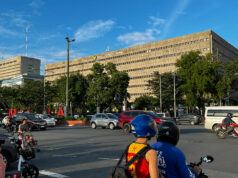Israel pushes cybersecurity, counter-terrorism partnership with PHL

By Adrian H. Halili, Reporter
ISRAEL is looking at working with the Philippines to improve the Southeast Asian nation’s cybersecurity and counter-terrorism programs, according to its envoy.
“We are pushing to have more exchanges in the area of counter-terrorism and cybersecurity,” Israel Ambassador to the Philippines Ilan Fluss told BusinessWorld in an interview. “There are ongoing talks, but again, we are basically waiting for the Philippine government to decide if there is an interest in these sectors.”
He said the consulate might partner with the Department of Information and Communications Technology (DICT) on programs involving cybersecurity.
“Cybersecurity is certainly an area that we are offering to collaborate closer,” he said. “Israel has a very advanced cybersecurity ecosystem. We have offered to have a collaboration with the DICT on cybersecurity and it’s on the table.”
Mr. Fluss said international cooperation and information-sharing would help mitigate cyberattacks.
“Only when you collaborate and share information can you get better solutions,” he said. “Other countries may have the same experience and could give advice. Only by international collaboration can you serve your country better.”
He said information-sharing between the government and private sector could also improve the Philippines’ cybersecurity protocols.
“Sharing information helps in countering those attacks and in mitigating them, and from every attack, you can learn and improve the system for everybody,” he added.
The Philippines faced about 17.1 million cyberthreats last year, 36.8% of users in the country, according to Kaspersky.
Separately, the Cybercrime Investigation and Coordinating Center logged 10,004 cybercrime complaints in 2024, a sharp increase from 3,317 cases a year earlier.
In 2023, ransomware group Medusa hacked into the systems of the Philippine Health Insurance Corp. and leaked sensitive data, including the bank details of about 42 million members when the government refused to pay a $300,000 ransom.
Mr. Fluss said they had also offered to collaborate with the Philippines on counter-terrorism initiatives.
“These are two very sensitive, very important areas… and we are looking forward to collaborating with the Philippine government,” he said. “It depends of course always on the Philippine government’s interest and priorities.”
The Philippines is among the most affected by terrorism in the Asia-Pacific region after Myanmar, according to the 2025 Global Terrorism Index released last month.



